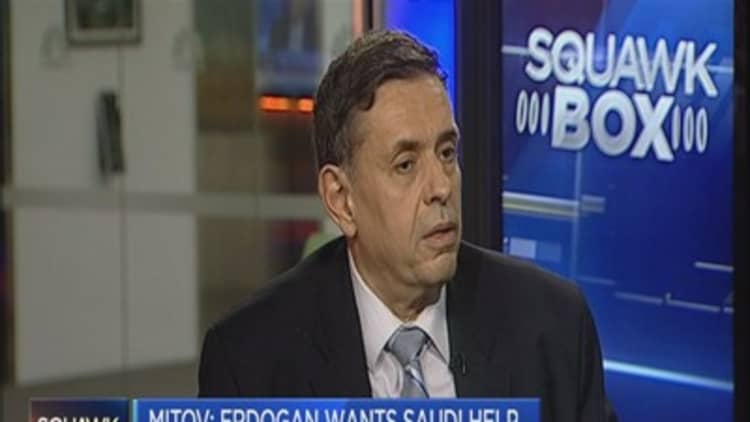
The past 12 months marked a "lost year" for Turkey, which would have experienced stronger economic growth had it not been for deteriorating geopolitical relations, an economist has told CNBC.
Unicredit's Chief Economist for Central and Eastern Europe Lubomir Mitov believes Turkey should have "benefitted tremendously" from the situation in Europe — where the central bank boosted asset purchases to buoy the economy — as well as low oil prices. However, internal political strife and geopolitics helped offset those gains, he explained.
"This was a lost year for Turkey," Mitov told CNBC Wednesday.
"Turkey is underperforming (and) has been underperforming for the full year...it's even underperforming after the elections. If you look at the markets, Turkey is probably 3 to 4 percent weaker than it should have been after the elections, but for these geopolitical problems," Mitov said.
Turkey's BIST 100 Index is down 13.4 percent year-to-date, while the dollar has gained nearly 25 percent on the country's lira over the past 12 months.
Peter Toogood, an investment director at City Financial Investment Company Limited, also argued that a lack of structural reforms are keeping Turkey from feeling the full benefits of economic boons like low oil prices.
"They're the flagship for everything that's wrong in emerging markets, they have wasted the opportunity. They've undertaken massive government spending, they've massively increased nominal wages...if there's an example of how to lose productivity advantage, they've been it," he said.
"The lira continues to decline, it has had no meaningful impact … the oil price has come down, (and) it should be the absolute example of a beneficiary, and it hasn't been."
Burning bridges
Though the previous government made efforts to maintain positive relations with neighboring states Mitov says that Turkey now has "almost no neighbors left," having sparked rows with Iraq, Syria, and Egypt.
Heightened tensions with Russia have also thrown a spanner in the works, he said, with Moscow clamping down on agricultural imports, setting stringent visa limits, and restricting tourism to Turkey. This coming after the military shot down a Russian fighter jet on the Syrian border on November 24, killing one of the two pilots on board.
Russia also announced Wednesday that it would ban Turkish companies from participating in state tourism, construction and hotel services starting January 1, according to Reuters.
Forecasts from the European Bank for Reconstruction and Development suggest the row with Russia could shave 0.4 percent off Turkish growth rates if sanctions are fully implemented throughout the next year.
Mitov said money from Europe — with about $3.4 billion being transferred to Turkey as part of plans to stem the flow of migrants into the EU — will help offset the pain from Russian sanctions. But he added that Turkey still isn't performing as strongly as it should be. Turkish officials have downgraded gross domestic product estimates for the year to 2.5 percent, from previous forecasts of 4 percent.
"(This) is very low for a country of the size of Turkey," Mitov said.



